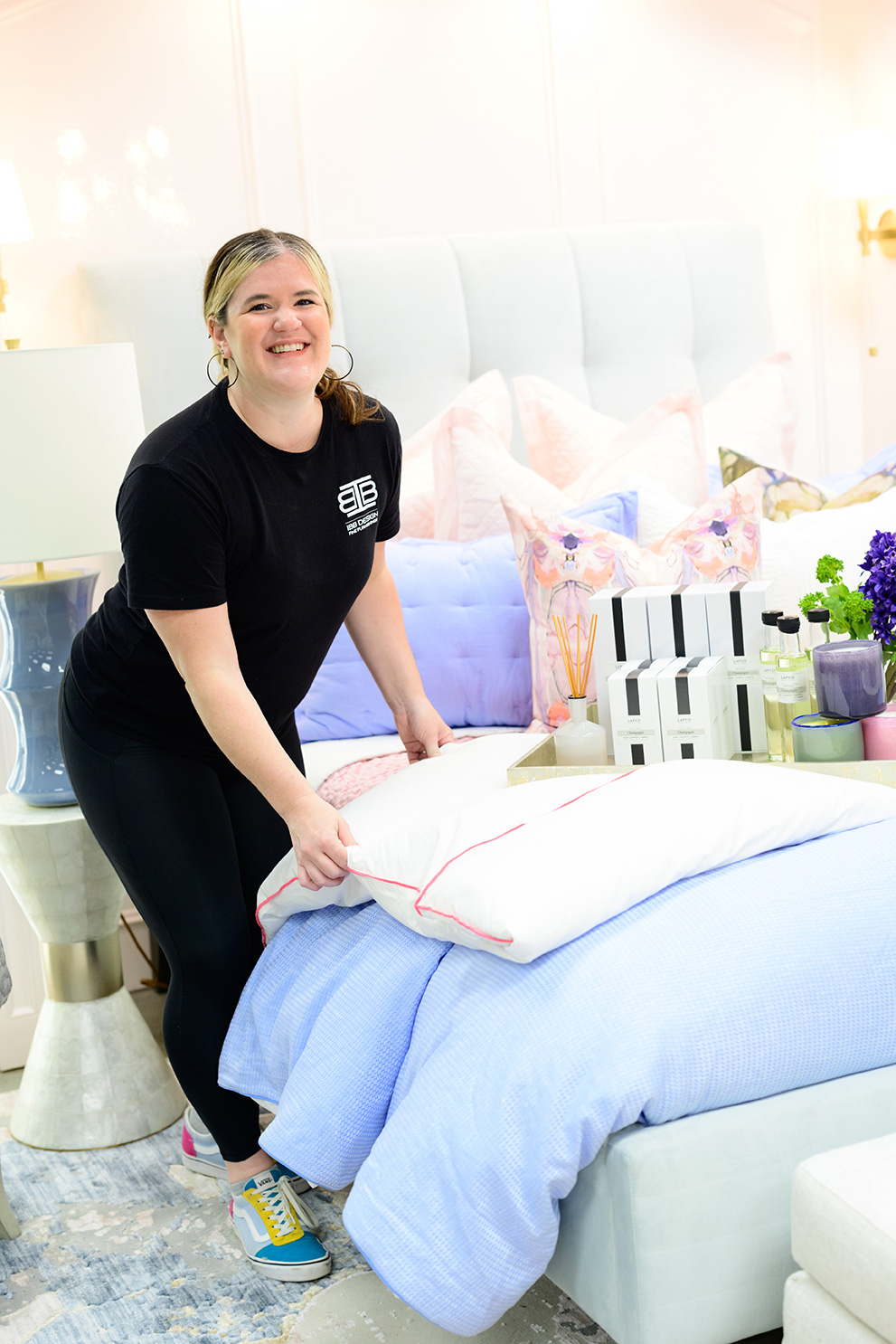Feng Shui Your Bedroom!
 Feng shui is the ancient Chinese art of arranging objects and space in an environment that achieves harmony and balance. Feng is roughly translated as wind, while shui means water. Dating back to 8,000 years ago, the concept of feng shui remains popular today as it aims to balance out the five main natural elements: Fire, Water, Metal, Earth, and Wood.
Feng shui is the ancient Chinese art of arranging objects and space in an environment that achieves harmony and balance. Feng is roughly translated as wind, while shui means water. Dating back to 8,000 years ago, the concept of feng shui remains popular today as it aims to balance out the five main natural elements: Fire, Water, Metal, Earth, and Wood.
The main goal is to achieve harmony in your home and allow chi, or energy, to move freely. Chi is thought to be the life energy in every living thing. The Chinese belief is that if you cultivate chi, you will be healthier and happier. By removing any barriers to this life energy, chi can flow through your home and prevent bad energy. It may seem exotic or even strange to some, but its core concepts are beneficial when it comes to room design and layout, as it aims to allow a free flow of energy throughout the home.
This principle is best used with a minimalist approach to design as it focuses on open spaces and very little clutter, but can easily lend itself to all design styles, centering on energy and flow of a space. It promotes balance, peace, and harmony – and where better to start than the bedroom! These tips can help achieve symmetry and tranquility in your bedroom and hopefully promote a healthier sleep cycle.
- Choose a Sturdy Bed with a Solid Headboard
The bed is the largest and most important piece of furniture in the bedroom, so it’s an excellent place to start. Choosing a bed for a feng shui bedroom is a crucial decision! A large bed that allows plenty of space to sleep comfortably is the best option. Look for a bed with a solid headboard. Ideally, it should be made with one material. Wood is recommended, as it is one of the five main elements. It’s warm, sturdy, and makes you feel secure. If that’s not possible, focus on finding a headboard without any slats or cubbies. A single, solid headboard promotes good sleep and will help improve relaxation at night. It helps to ground the bed and provide support for sleep. - Select the Bed’s Position Carefully
Bed placement is super important; this is what feng shui is all about! The bed should be placed in the middle of a wall, rather than under a window or in the corner of the room. When following feng shui, avoid placing the bed in a defensive position. A feng shui bed should never be directly opposite the door to the room, as this unconsciously could create angst when sleeping. It emanates being in direct line of an intruder if one enters the room. This can make you feel nervous even if you are not aware of why. Instead, aim to place the bed diagonal to the wall with the bedroom door. If it must be on the opposite wall, make sure that the bed isn’t centered with the door. The door shouldn’t open onto the bed, either from in front or to the side of it. There should be some space between the door and the bed for optimal energy flow. Also consider what’s on the other side of the wall. Feng shui teaches avoiding having the bed against a toilet or sink on the opposite side. That symbolizes a drain of energy (and it can be noisy as well) and could disrupt sleep. - Create Symmetry in the Bedroom
 Once the bed is in position, think about the other furniture and bedroom items. The goal is to aim for a symmetrical room that creates harmony and a sense of balance. For example, it’s better to have nightstands on each side of the bed, rather than just one. That helps to keep the room feeling even and balanced. Create symmetry through color, artwork, and the visual weight of the items. It doesn’t have to be perfect as long as it all comes together cohesively. Ideally, the best furniture for a feng shui room will have rounded corners. That allows chi to flow more smoothly around things. If possible, look for round bedside tables or softened edges rather than sharp corners.
Once the bed is in position, think about the other furniture and bedroom items. The goal is to aim for a symmetrical room that creates harmony and a sense of balance. For example, it’s better to have nightstands on each side of the bed, rather than just one. That helps to keep the room feeling even and balanced. Create symmetry through color, artwork, and the visual weight of the items. It doesn’t have to be perfect as long as it all comes together cohesively. Ideally, the best furniture for a feng shui room will have rounded corners. That allows chi to flow more smoothly around things. If possible, look for round bedside tables or softened edges rather than sharp corners. - Remove Screens and Electronics from the Room
There’s a lot of wisdom in feng shui that helps regulate sleep patterns; this can be implemented to its extreme or just by cherry-picking aspects that suit you best. You don’t have to go all-in. Personally, I removed the TV from my bedroom, but I keep my cell phone next to my bed. It’s about compromise! We live in a much more technology driven world than ancient Chinese philosophers could have ever predicted, but I am a firm believer that it is beneficial to unplug at nighttime. There have been many studies showing blue light from screens affects sleep. Taking it even further, feng shui recommends having no electronics at all if possible.
That means removing everything from cell phones and TV to an alarm clock and lamps. The idea is that any unnatural light disrupts the energy flow through the room. It can lead to disturbed sleep and interrupt natural sleep patterns. Leave phones, laptops, and tablets in another room. Try it for a week and see how your sleep pattern is affected. It might surprise you! - Go for Soothing, Natural Lighting
If you’re feng shui-ing your bedroom, you want to let in as much natural light as possible. Don’t block windows with heavy drapes or bulky furniture. Choose window dressings carefully to maximize natural daylight, and cut out any artificial light from outside, such as light pollution from streetlights, so you can sleep well. Opt for blackout drapes or blinds in a natural, calming color. It should block that bright artificial light and harmonize with the colors in your room. If you live in a rural area without much light pollution, you can go with thinner drapery fabric. That will allow natural light from the moon to filter through and encourage you to wake with the sun. More natural light leads to a regular circadian rhythm. As a result, you should wake up feeling rested, energized, and ready to go, and possibly experience improved focus, productivity, and mood! If you don’t get enough natural light, then go for soft, soothing light sources like table lamps – even better if they are dimmable.
You can also enhance the ambiance with candles. The warm, golden light they emit is perfect for the feng shui bedroom and creates more energy in the room. - Use a Calm, Neutral Color Palette
Color palette is another important decision for your feng shui bedroom. Color psychology is a real phenomenon that shows how different colors’ qualities cause certain emotions in people. It easily applies to your home and can affect your mood and how you feel in a space. For example, bright colors like red, orange, dark purple, or yellow are very stimulating. They create energy and encourage the brain towards creativity, passion, and even anxiety. In contrast, your bedroom should promote calm, relaxation, and restfulness. The best colors for this are natural tones such as white, cream, beige, light brown, light blues, and pale green.
Paler pastels and light shades are preferable to saturated tones. Choose two to three different shades and use them throughout the room for continuity. Opt for natural and environmentally-friendly materials. I recommend using natural materials and colors for your bedding. Go for high-quality linen or cotton for sheets and blankets with natural tones.
Final Thoughts
Feng shui-ing your bedroom is not as complicated as you might have thought. By following these tips, you can create a calm and relaxing space. It could lead to a better night’s sleep and feeling more refreshed and ready to go about the day. Your feng shui bedroom is the perfect place to escape from life’s stresses and allow yourself to rest.
